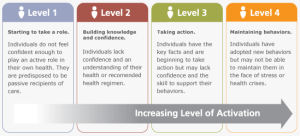A recent article in the Wall Street Journal makes a strong case for patient activation. Patient activation refers to a patient’s knowledge, skills, and confidence to manage their own health. According to the article, “patients who are highly activated have better outcomes and incur lower costs, studies show, even though as many as 40% of Americans lack the knowledge, skills, and confidence to become model patients.”
The concept of patient activation was developed by Judith Hibbard, senior researcher at the University of Oregon’s Health Policy Research Group. Dr. Hibbard has championed patient activation for the past ten years and cultivated rigorous research standards surrounding its application to a range of health settings.
We need more champions for patient activation. When we build the capacity of patients to take charge of their own health needs, who knows how much we can accomplish?
In 2008, Donald Berwick, then President and CEO of the Institute for Healthcare Improvement (IHI), published a landmark article on the Triple Aim of better patient experience, improved health, and reduced costs as the key to improving the US health care system.
For such an initiative to work, patients will have a big role in driving the change, and patient activation may be the key we’re really looking for.
Triple Aim
- Better patient experience
- Improved health
- Reduced cost
Patient Activation
- Knowledge
- Skills
- Confidence
The Triple Aim just found its match.





Great post, Luz. I can imagine some day in the future when findings like this seem obvious. But at the moment, they are insightful, compelling and very welcome. Thanks for the good news!
Great post. I’ve used the PAM personally with coaching clients, and made it the core concept of a care delivery model I’ve submitted to CMS innovations. I believe patient activation is the key to reform. I would welcome a conversation or collaboration with anyone who feels the same passion for using the PAM to be the solution for our current population health issues across the country.
Very nice post. Unfortunately I have found that most doctors in my
HMO want patients to be passive. I am a very well-educated patient about some fairly complicated and not well understood conditions (e.g. Fibromyalgia). The rheumatologist when I presenteded myself in a great deal of pain said in a stealy ton “there is nothing wrong with you.” Why can’t doctors at least have the modesty to say that “given our current measuring instruments we cannot see what’s wrong with you but we can still help.) The first pain doctor thought the pain was caused by depression (my psychiatrist had to all this arrogant doctor three times before correcting the record. So doctors have their work to do as well. Be more honest with your patients about what’s on your mind, never tell a person who is suffering that there is nothing wrong with them, and so so These are only two examples of the kinds of encounters that I have experienced and that I think lead to the silencing of patients. It’s dreadful not be be heard by those who are supposed to be dedicated to helping you.
Great post indeed! A new development in the UK is “My Medication Passport”, a small easy to carry booklet which enables patients to start tracking their medicines and medical conditions, screenings etc.. and enter information as it relates to their personal situation, using post it notes if they want in order to customize such contents. It was designed by patients for patients and is seen by many users as the very first tool they own to become more involved in their care, more activated. Entering info about one’s meds. ADRs, side effects, allergies etc.. is one sure step towards activation.
Thanks Fran for sharing information about the Medication Passport. Patients need easy to use tools that will facilitate their activation and engagement.